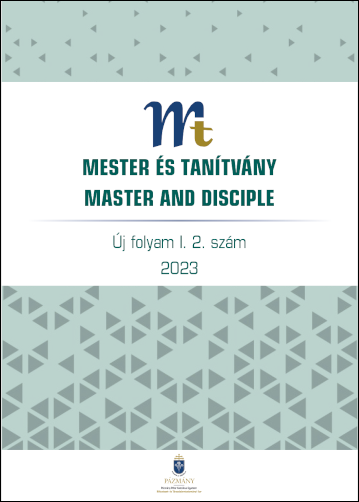Published 31-12-2023
Keywords
- School Community Service,
- development of social competences,
- service-learning,
- community service,
- action sociale
Copyright (c) 2023 Bodó Márton

This work is licensed under a Creative Commons Attribution 4.0 International License.
Abstract
This study on the School Community Service (IKSZ) practice in monastic schools attempts to answer the following questions: What are the international ecclesiastical antecedents of the introduction of IKSZ in Hungary? What international examples exist for effective service-learning programs that increase social sensitivity? Since the introduction of community service in 2012, how did the professional support for the program developed in the Hungarian public education system? How did the introduction of IKSZ in 2012 impact the former TESZI program in monastic schools? How did the program change during the covid pandemic? What are the 3 models that can be outlined in the practice of monastic schools for the pedagogically effective or less effective use of IKSZ in terms of developing social competences? There is a narrow circle of monastic schools that introduced the program adopted from the Fényi Gyula Jesuit High School, popularly known as TESZI, even before the introduction of the IKSZ in 2012, and struggled with adaptation, integration with the IKSZ, and the situation during covid. These schools represent 2 different models, and Fényi Gyula's path represents a 3rd possible approach. All of this can provide multiple lessons for the public education system as a whole. The
following options are outlined: using the program for the development of social competences; using the program for other pedagogical purposes.
References
- 2011. évi CXC. törvény a nemzeti köznevelésről közösségi szolgálatra vonatkozó részei
- 20/2012. EMMI rendelet 133.§
- Assisi Szent Ferenc perugai legenda http://ofm.ro/kolozsvariferencesek/perugiai
- Bodó Márton (2014). A közösségi szolgálat 2011-es bevezetése és tanulságai. In Új Pedagógiai Szemle, 3–4. szám. 2014. 47–68.
- Bodó Márton (2019). Esettanulmány a marseille-i Lycée de Provance Szociális Cselekvés programjáról In Szociálpedagógia 2019/13, 186–210.
- Bodó Márton (2010). Gondolatok az értékelvű vizsgáról In Mester és tanítvány, 2010 február 25. szám 57–64.
- Dorner László (2019). A serdülő- és ifjúkori önkéntességgel kapcsolatos tapasztalatok empirikus vizsgálata. In Új Pedagógiai Szemle. 2019/1–2., 23–45.
- Furco Andrew (1996). „Service-learning: A Balanced Approach to Experiential Education.” https://digitalcommons.unomaha.edu/cgi/viewcontent.cgi?article=1104&context=slceslgen. (2023. 04. 09.) magyarul Kiss Anna fordításában In Szolgálati tanulás. A tapasztalaton alapuló oktatás kiegyensúlyozott megközelítése, Szociálpedagógia 2019/13, 5–13.
- Gottfried Adam (2008). Diakóniai-szociális tanulás: Egy új koncepció eredete, jellege és távlatai. In Lelkipásztor, 83. 12. sz. 442–451. https://archiv.evangelikus.hu/teologia/gottfried-adam-diakoniai-szocialis-tanulas-2013-egy-uj-koncepcio-eredete-jellege-es-tavlatai/files/adam_cikk_2011jun09.pdf (2023. 03. 25.)
- Gyorgyovich Miklós – Menich Dóra – Simon Nikolett – Kollár Dávid – Szodorai Dóra (szerk.) (2018): Önkéntesség Magyarországon. Századvég.
- Idigoras, José Ignacio Tellechea (2022). Egyedül, gyalog – Loyolai Szent Ignác élete. Jezsuita kiadó, 127.
- Juhász Orchidea (2022). Service learning: a tanulási célú közösségi szolgálat. Egy útkereső reflexiói. In Új Pedagógiai Szemle. 2022/11–12. 5–16
- Karlowitz - Juhász Orchidea (2014). Pedro Arrupe és a „másokért élő ember” eszménye, Zempléni Múzsa, 14. évfolyam 4. szám (2014 tél) 5–11.
- Lengyel Oktatási Minisztérium 2019. augusztus 21-i rendeletének 7. §-a (134. cikk (2) bekezdés 4. pontja: . www.gov.pl/attachment/f2aa78b4-b2b6-45f6-a31d-e20ec06e740d, (2023. 03. 18.).
- Markos Valéria (2021). Kik a nyertesei az iskolai közösségi szolgálatnak? – az iskolai közösségi szolgálat iránti pozitív attitűdöket befolyásoló tényezők vizsgálata, In Önkéntes Szemle, 1. évfolyam, 1. szám, 69–82.
- Markos Valéria (2016). Közösségi szolgálat vagy önkéntesség? In Education 2016/3, 444–450.
- Meschedei Compassion program (2023) https://gymn-benedictinum.de/index.php/wiroeffnen-uns/21-compassion (2023. 04. 07.)
- Nagy Ádám – Trencsényi László (2012). Szocializációs közegek a változó társadalomban, ISZT Alapítvány, 2012.
- Nárai Márta – Balázsné Mátyus Barbara (2022). Társadalmi érzékenyítés és önkéntességre motiválás az iskolai közösségi szolgálat tapasztalatai a fogadószervezetek oldaláról. In Az önkéntesség színei, szerk. Nárai Márta és Tóbiás László, Gyerekparadicsom Alapítvány. 105–130.
- Nemzeti Önkéntes Stratégia 2021–2030 tervezet (2021). https://eta-szov.hu/2021/04/12/nemzeti-onkentes-strategia-2021-2030-online-tarsadalmi-konzultacio/
- Report from mapping of the educational situation in the Central and Eastern European region with focus on service-learning. (2019). Brozmanova Gregorova, Alžbet–Bariakova Zuzana a Kubišova Ľuboslav– Murray Svidroňova, Maria; Šolcova, Jana, CLAYSS, Centro Latinoamericano de Aprendizaje y Servicio Solidario, Latin-American Center for Service-Learning, Buenos Aires.
- Sárosi Tünde (2019). Polgári Szolgálat Franciaországban, Szociálpedagógia 2019/13, 36–57.
- Sárosi Tünde (2022). Az iskolai közösségi szolgálat pedagógiai elemei és szerepe a személyiségfejlődésben, doktori értekezés, Eszterházy Károly Katolikus Egyetem, Neveléstudományi Doktori Iskola.
- Szent Ferenc Perugai legenda http://ofm.ro/kolozsvariferencesek/perugiai
- Szent Ursula Gimnázium programja (2023). https://www.st.ursula-wien.at/AHS/index.php/ahs-gymnasium/was-wir-anbieten/schulprojekte-sport-sprachreisen/26-compassion-soziale-verantwortung-lernen (2023. 04. 10.)

